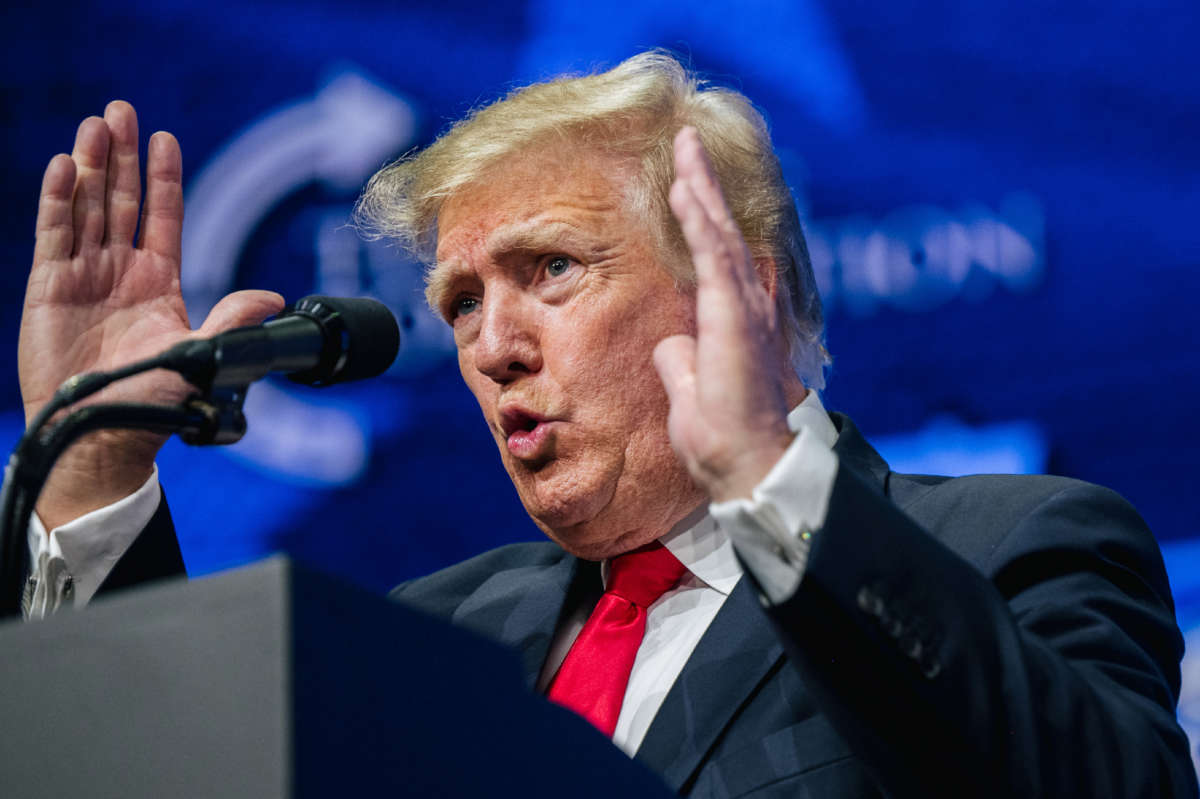As Republicans scuffled with Democrats and the White House over the massively watered-down bipartisan infrastructure package on Monday, former President Donald Trump issued a statement pressuring the GOP to drop the negotiations entirely.
Trump said that the negotiations make the Republicans look weak and criticized Minority Leader Mitch McConnell (R-Kentucky) for capitulating to Democrats’ demands on the infrastructure bill, even though McConnell isn’t part of the bipartisan group forming the package. It’s McConnell, too, who has been unforgivingly critical of the Democrats’ proposals on infrastructure.
The former president also said that the Republicans should wait until 2022 to pass an infrastructure package, when he thinks “proper election results” — Republican-favoring results — could come in.
“Don’t do the infrastructure deal, wait until after we get proper election results in 2022 or otherwise, and regain a strong negotiating stance,” Trump said. “Republicans, don’t let the Radical Left play you for weak fools and losers!”
Trump’s statement comes as Republican senators are blaming Democrats for yet another delay in the process, despite the fact that it’s the GOP that has dragged the infrastructure talks on for months. The statement from the former president, not known to mince words as much as his Republican colleagues, is also a show of the Republican mindset on the bill.
President Joe Biden and Democrats have already agreed to massive cuts to the infrastructure bill. The topline new spending has come down from $4 trillion to $579 billion, shedding many of the climate and socioeconomic measures from Biden’s original proposal along the way. Republicans have also had their way with the pay-fors on the bill, successfully cutting provisions to tax corporations and the wealthy and even nixing a proposal to fund the Internal Revenue Service to enforce existing tax laws on the rich.
For Republicans, cutting nearly all of the transformative measures from the bill evidently isn’t enough. Democrats sent Republicans an offer on Sunday to wrap up outstanding disagreements on the bill, which Republicans not only rejected but also branded as an insult, saying that the items on the Democrats’ offer were already decided.
The debacle is laying bare what appears to be the Republican strategy on negotiating for the bill, and elsewhere: Force Democrats to capitulate, or else threaten to withdraw GOP support altogether, thus imperiling the passage of the bill itself. It’s also possible that the Republicans, forever dangling the bipartisanship carrot in front of Democrats, were always planning to make good on their threats to kill the legislation in the end and make Democrats look weak.
Now Trump telling Republicans to withdraw their support reinforces that message. Republicans have largely gotten everything they wanted; the total figure for new spending in the bipartisan bill, $579 billion, is far closer to the GOP-only infrastructure offer of $257 billion from May, than Biden’s original proposal of $2.25 trillion.
Allowing Republicans to delay and weaken the bill over the course of several months is precisely what progressives were warning against early in the process for the bill. In May, Sen. Bernie Sanders (I-Vermont) warned the White House against negotiating with the Republicans, saying, “the bottom line is the American people want results.”
The public doesn’t always consider whether or not a bill was bipartisan when they see tangible positive results, Sanders said. “Frankly, when people got a, you know, $1,400 check or $5,600 check for their family, they didn’t say, ‘Oh, I can’t cash this check because it was done without any Republican votes,’” said the senator, referring to the direct relief payments passed in the American Rescue package.
Sanders warned later that month that Democrats could lose Congress in the midterm elections if they push too hard for bipartisanship with the party that has a stated disinterest in the practice. Progressives in Congress also put pressure on the White House to stop giving in to Republican demands on infrastructure, saying that they would withdraw their support for the bill if it omitted crucial proposals to address the climate crisis.
Press freedom is under attack
As Trump cracks down on political speech, independent media is increasingly necessary.
Truthout produces reporting you won’t see in the mainstream: journalism from the frontlines of global conflict, interviews with grassroots movement leaders, high-quality legal analysis and more.
Our work is possible thanks to reader support. Help Truthout catalyze change and social justice — make a tax-deductible monthly or one-time donation today.
